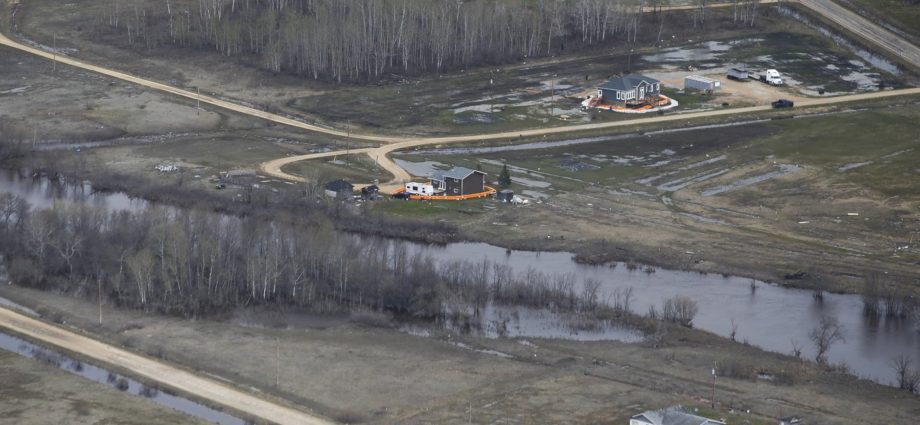
By Dave Baxter, Local Journalism Initiative Reporter, Winnipeg Sun
May 26, 2022
After watching flood waters destroy properties and force thousands out of their homes in the Peguis First Nation, Indigenous leaders at all levels are coming together to demand that the province and the federal government finally do something to stop flooding and destruction in Peguis.
“Peguis citizens have been caught in the middle of disagreements between the federal and provincial governments for many generations,” Peguis First Nation Chief Glenn Hudson said in a news release put out jointly by the Peguis First Nation, and the Southern Chiefs Organization. (SCO)
“It’s time to work together and focus on solutions to build permanent flood infrastructure, similar to what exists in all non-Indigenous communities across this province.”
On Thursday, there were reports that as many as 700 homes had sustained some type of damage in the Peguis First Nation, a community of about 3,500 on-reserve residents that sits 190 kilometres north of Winnipeg, due to floodwaters from the Fisher River that have been ravaging the community this spring.
This year’s flood in Peguis marks the fifth time that the community has dealt with flooding in the last 16 years, as previous floods in 2006, 2009, 2011 and 2014 also led to damage and evacuations.
And although the community is no stranger to flooding, Hudson is now calling this spring’s flooding the “worst flood in Peguis history.”
The flood has also forced thousands from their homes and many into hotel rooms in Winnipeg, as on Thursday the Peguis First Nation said that there were 1,870 members who were currently evacuated from their homes, and from the community.
With flooding being so common, some who live and work in Peguis are now questioning if “systemic racism” has played a role in Peguis continuing to have no permanent flood protection.
“The lack of proper permanent infrastructure to protect Peguis from recurring flooding constitutes nothing less than systemic racism,” Peguis Emergency Management lead William Sutherland said.
“How else could this double standard exist when it comes to flood protection of First Nations communities, versus non-First Nations communities?”
On May 16, an Indigenous Services Canada (ISC) spokesperson confirmed to the Winnipeg Sun that the federal government and the province split the cost of a study that was undertaken in 2006 that looked at the reasons for flooding in Peguis, and to determine what permanent solutions could be undertaken to mitigate flooding risks in the community.
According to ISC, the study put forth several options for improving flood protection in Peguis, including an option to construct a flood diversion channel, and another to build a series of dikes.
But as of this spring, there continues to be no permanent flood protection in Peguis.
The Assembly of Manitoba Chiefs (AMC) Acting Grand Chief Cornell McLean called on the province to work with First Nations leaders and communities to find solutions for First Nations, which he said are consistently “hardest hit” by flooding in Manitoba.
“The AMC has urged the province to expedite the construction of outlet channels to stop the constant flood damage on First Nations, but no action to engage First Nations on projects has been taken so far,” McLean said in a news release.
“First Nations are the hardest hit by flooding in this province and are evacuated almost every year, yet we are never meaningfully consulted on flood protection or long-term mitigation actions.”
He also questioned if any non-Indigenous communities in Manitoba would be forced to deal with the continued flooding and destruction that has been seen in the Peguis First Nation over the last many years.
“The province acts quickly when it comes to protecting and compensating property and business owners in the communities surrounding First Nations, but isn’t as responsive when fulfilling its duty to involve First Nations in planning related to the protection of our lands and territories from flooding,” McLean said.
In a statement sent to the Winnipeg Sun on Thursday, the province said they are now “committed” to finding permanent flood mitigation solutions in Peguis, but said those solutions also have to come from the federal government.
“The frequency of flooding at Peguis First Nation is troubling, and our government shares the view that longer-term mitigation is required. This is a challenge being experienced by many communities, as part of one of the worst Manitoba floods on record,” the spokesperson said.
Subscribe to our newsletter.
“While the province’s immediate focus has been on effectively addressing the emergency needs of all Manitobans impacted by the ongoing flooding across many parts of the province, we are committed to addressing longer-term mitigation steps in partnership with the federal government, First Nations, and other surrounding communities.”
Dave Baxter is a Local Journalism Initiative reporter who works out of the Winnipeg Sun. The Local Journalism Initiative is funded by the Government of Canada.



